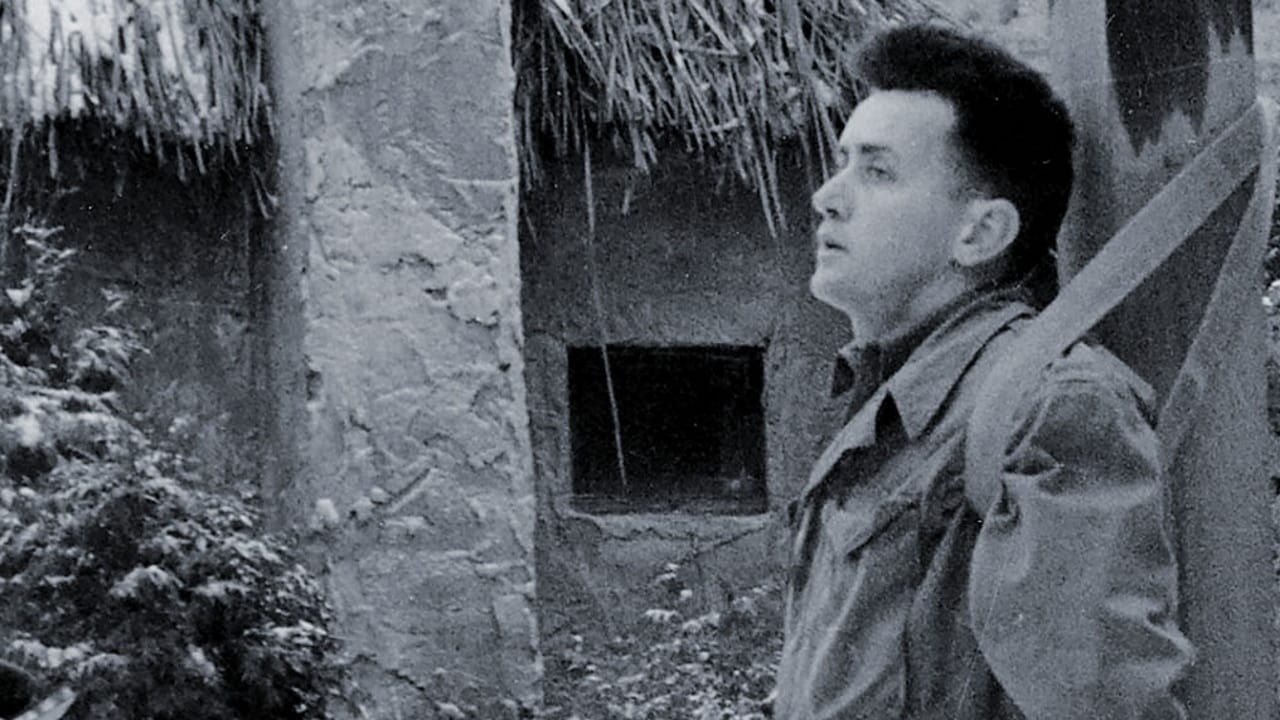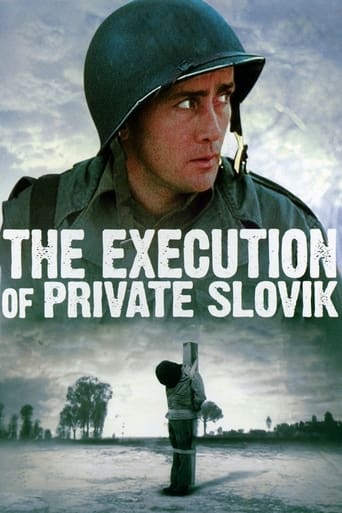ada
the leading man is my tpye
SparkMore
n my opinion it was a great movie with some interesting elements, even though having some plot holes and the ending probably was just too messy and crammed together, but still fun to watch and not your casual movie that is similar to all other ones.
Kamila Bell
This is a coming of age storyline that you've seen in one form or another for decades. It takes a truly unique voice to make yet another one worth watching.
Philippa
All of these films share one commonality, that being a kind of emotional center that humanizes a cast of monsters.
ccthemovieman-1
This was made-for-TV movie shown about 30 years ago about the only American since the Civil War to be shot for desertion. Slovik (Martin Sheen) was a strange person and I didn't know how to react to this story, frankly. I knew Hollywood was going to give it its usual liberal bias, especially with Sheen in the starring role, so I tried to look at this objectively with no prejudices - something I don't see here with any of these reviews.Unfortunately, in trying to be totally neutral, it's easy to watch this film and come away with no definite stance. On one hand, you can't blame the military because it would be in chaos if every soldier who didn't want to fight could get out of it. That's ludicrous. On the hand, Slovik was such a nice, gentle guy, the death penalty for his actions seemed severe, too. Couldn't something else have been worked out? I don't know, and at least I'm being honest. I never was in the military and maybe if I was, it would be an easier call. It is a tough call....but at least the film - except for a couple of lulls with the romance angle - kept my attention and made me think about an issue, so it served its purpose.
lord woodburry
This film received and deserved the many comments it has received. Indeed I think of Private Slovik whenever I see The Bush decked out in his cute little airforce suit declaring victories in Irak. But for a rich Dad, The Bush's story could have been the same.The film was excellently made. Martin Sheen departed from his usual tough guy All American role to play the snivelling coward Pvt Slovik whose very name excited the passions of the surviving veterans of "The Big One" whenever a Democratic President proposed rehabilitation as Johnson and Carter would have but for the intense opposition they encountered. Certainly one can sympathize with the character Sheen played as he happily profits while others receive draft notices or volunteer for war.But wars, even one so popular with the liberal intellectuals as World War II, cost. The manpower pool drains and less likely men such as Slovik must be called upon.Oh yes Slovik was no kind of soldier. A Sergeant had to fake Slovik's rifle range card to get Slovik out of BCT (Basic Training.) It would seem Slovik's military career got off to an inauspicious beginning. In combat Slovik deserts and refuses to return to the front.Was Pvt Slovik justified in being afraid? Of course he was! Every sane person who heard rifles crackle was afraid. Pvt Slovik differed. He acted on his fears. If everyone in a military unit acted on fear, the resulting panic would lead to disastrous defeat. In combat with an enemy like the German Reich or Imperial Japan, defeat would not have been a matter like paying off the enemy with a grain deal but would have had a direct and disastrous effect on major segments of the American population.Slovik played the system. Offered the chance to return to the front, he gambled on a courtmartial and lost. With the type of casualties incurred in combat, the result was obvious. Slovik figured the sentence would be remitted and reduced to 30 years. With bravado not shown to the enemy, Slovik prophesied that after the war it'd be reduced to time served.Instead he was led to the firing squad, the only possible end under the circumstances. He stands as a tribute to the irrationality of war. We can only justify the sacrifices of combat by the punishment meted out to those who shrink from it.
richard.fuller1
It was 1974 and it starred Martin Sheen.That alone says what to expect of this movie.And it was a movie. According to the movie, Slovik had reformed, got a good woman, and didn't want to fight.In real life, Slovik may have been a naive innocent, or he may have just wanted to manipulate the system.Whoever Slovik was or wasn't is for history to decide, but this was a movie that dealt with dessertion at a time when a country was questioning why it was fighting, and the movie took sides.With no regard to servicemen who were in Viet Nam either in 1974 (as Willie Nelson would say, let's tell the truth, it was about the Viet Nam war, not WWII), EoES was as propagandistic as Gung Ho was in the forties.According to this movie, Slovik stated his position, plain and simple. He had a nervous problem. Heck, I have a clinical nervous condition, and trust me, if I had done military duty, it would have been no problem for me to either just let my nerves go and fail at my tasks and get a demotion or put on KP duty or latrine duty with no problem.If we believe the teleflick, Slovik didn't have that option, no doubt because of his criminal history.Whatever the viewer wants to believe is up to the viewer. I've learned that movies from this decade or that decade, in dealing with service or military duty, will pretty much take the same stance over and over.1940s and 1950s, serve your country.1960s and 1970s, mock your country.This is the history.The whole movie seemed predictably Hollywood to me. He refused to serve and only when he was being strapped up to be executed does he show emotion.Such an emotional outburst could have easily worked to his advantage in his declaration of his nervous condition, but obviously the movie wanted to show him as a human being and only when he is about to die does he become sorrowful.I'm not a Catholic, but I thought the recital of the hail Mary by Ned Beatty and Sheen at the end, with the Lord's prayer, was funny as it sounded like they were trying to see who could say it faster.I don't see how this movie could be watched without realizing it was aimed at Tricky Dick Nixon and the Viet Nam war.I hope it was all worth it for Slovik and anyone who chose to follow his example.
Sheldon Berger
I remember reading the book in 1966 and seeing the movie in 1974, and the facts seem to be correct. Some think the movie was made as a statement after the war with Viet Nam. I am not going there. I am a Viet veteran myself, and feel this dissection of the movie is guesswork. Martin Sheen was absolutely great. He captured the emotions of Pvt. Slovik very well. You could almost feel your own stomach churning as he headed for his execution. Did he deserve to die, yes, was it an extremely unfortunate situation, again yes. Faced with a firing squad, there is no doubt, as weak-kneed as I would be, I would take my chances on the battlefield as I assume, most would. I believe Pvt. Slovik truly believed he would not be executed, but picked the wrong time in history to make such an assumption.

